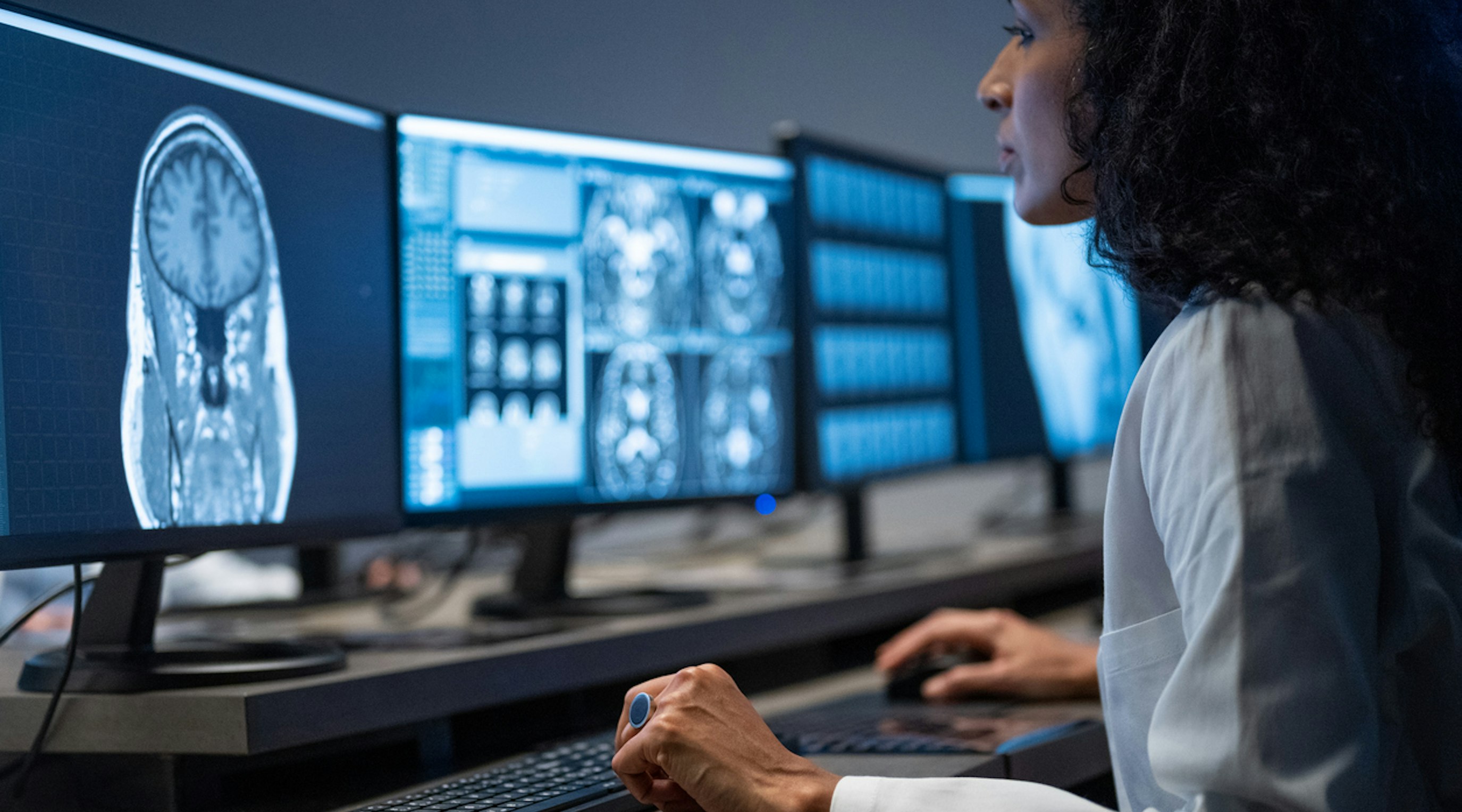Exploring the effects of medical cannabis for neurological conditions
10 min read
Emily Ledger
Cannabis-based medicines can be prescribed to patients in the UK for the treatment of a wide range of conditions. Among these are several neurological conditions, including multiple sclerosis, epilepsy, Parkinson’s disease and ADHD. In this article, we take a look at the causes and characteristics of these conditions and assess the evidence for the potential efficacy of medical cannabis.
Contents
What are neurological conditions?
Neurological conditions or disorders are conditions that affect the central and peripheral nervous systems. These systems include the brain, spinal cord, cranial nerves, peripheral nerves, nerve roots, autonomic nervous system, neuromuscular junction, and muscles.
Neurological conditions affect hundreds of millions of people worldwide. This includes more than 50 million people with epilepsy, more than 10 million people with Parkinson’s disease, and around 2.3 million people with multiple sclerosis. Other neurological conditions include Tourette’s syndrome, attention-deficit hyperactivity disorder (ADHD), and stroke.
Epilepsy
Epilepsy is the fourth most common neurological condition behind stroke, migraine, and dementia. The condition affects the brain, causing frequent seizures - sudden bursts of electrical activity in the brain. There are several types of seizures which can vary from a brief lapse in attention to muscle jerks, and severe and prolonged convulsions.
Epilepsy can affect people of all ages, but symptoms usually start in childhood. The condition is often lifelong, but some patients will experience improvements in their symptoms over time. It is estimated that around 70% of people with epilepsy can live seizure-free with the right diagnosis and treatment; however, many patients struggle to access effective therapies.
Managing epilepsy
Treatments for epilepsy focus on controlling the frequency and severity of seizures. This can include:
- Anti-epileptic or anticonvulsant medications
- Surgery to remove the part of the brain causing the seizures
- Inserting a small electrical device inside the body to help control seizures
- Special diets, such as the ketogenic diet.
Parkinson’s disease
Parkinson’s disease is a progressive neurological disorder in which parts of the brain become progressively damaged over time. The condition predominantly affects the dopamine-producing (dopaminergic) neurons in the region of the brain called the substantia nigra. Symptoms of Parkinson’s develop slowly over many years and can include:
- Tremors - involuntary shaking or movement in parts of the body
- Slow movements
- Stiffness and loss of flexibility in muscles
- Gait and balance problems
Non-movement symptoms of Parkinson’s can also include anxiety and depression, hallucinations, sleep disorders, and cognitive impairment. The causes of Parkinson’s disease are largely unknown but scientists believe genetics and environmental factors play a role.
Managing Parkinson’s disease
There is no cure for Parkinson’s disease and treatments focus on symptom management and maintaining patient quality of life. This can include supportive treatments such as physiotherapy and occupational therapy, dopaminergic medications, and, in some cases, brain surgery.
Multiple sclerosis
Multiple sclerosis (MS) is an autoimmune disease that affects the brain and spinal cord. The condition occurs when the immune system mistakenly attacks the myelin sheath - a protective layer surrounding nerves. The resulting damage disrupts nerve signals, causing a number of symptoms. The most common symptoms of MS include:
- Fatigue
- Problems with eyes or vision
- Numbness and tingling in the body
- Muscle cramps, stiffness and spasms
- Gait and balance problems
- Cognitive impairment
There are three main types of MS: relapsing-remitting, secondary progressive, and primary progressive.
Managing MS
There is no cure for MS, but treatments are often effective at managing symptoms and slowing the progression of the condition. Depending on the type of MS, patients may be prescribed different treatments, including steroid medications, disease-modifying medicines, muscle relaxants, and analgesics. Many patients with MS will also receive support from a physiotherapist and occupational therapist.
Tourette’s syndrome
Tourette’s syndrome is a neurological disorder that causes sudden, involuntary sounds and movements called tics. Most people experience strong premonitory sensations before a tic that are only relieved when the tic is carried out. Tics can be exacerbated by certain triggers such as emotional stress and can have a significant impact on a person’s education, relationships, and professional life.
Tourette’s usually begins in childhood and often improves with age. It is believed to affect around 1% of the UK population and typically occurs alongside obsessive-compulsive disorder (OCD), attention-deficit hyperactivity disorder (ADHD) or learning difficulties. People with Tourette’s syndrome are also at higher risk of anxiety and depression.
Managing Tourette’s syndrome
Treatments for Tourette’s syndrome often include a combination of medications and behavioural therapy. This includes habit reversal training and ‘exposure with response prevention’ therapy. Medications may be prescribed when tics are more severe or are affecting daily activities. However, medicines for Tourette’s are not always effective and can have undesirable side effects.
Attention-deficit hyperactivity disorder (ADHD)
ADHD is a neurobehavioural and neurodevelopmental disorder that often develops in early childhood. People with ADHD may have trouble concentrating and may be impulsive and restless. The cause of ADHD is not fully understood; however, it is believed to run in families and it may be linked to differences in the brain, premature birth, low birth weight, and smoking or alcohol use during pregnancy.
For some people, the symptoms of ADHD improve with age, but many people continue to experience symptoms into adulthood. The condition is typiclly also associated with sleep problems and anxiety disorders.
Managing ADHD
In children, educational support and medication are often offered to manage the symptoms of ADHD. In adults, medications are the first line of treatment, sometimes alongside cognitive behavioural therapy. There are five types of medicine licensed for the treatment of ADHD: methylphenidate, lisdexamfetamine, dexamfetamine, atomoxetine, and guanfacine. However, these medications are not a permanent cure for ADHD.
Medical cannabis treatment for neurological conditions
On the 1st of November 2018, the UK government introduced legislation to reschedule medical cannabis, allowing specialist doctors to prescribe cannabis-based medicines for a range of conditions.
This move was largely influenced by the stories of two children with rare forms of treatment-resistant epilepsy. Billy Caldwell and Alfie Dingley had achieved improved seizure control with the help of medical cannabis, leading their parents to campaign for a change to UK law.
Now, over five years later, patients across the country can access cannabis-based medicines for a range of conditions. However, the vast majority of patients rely on private medical cannabis clinics like Releaf as access through the NHS remains extremely limited. Several neurological conditions are among the conditions eligible for medical cannabis prescriptions.
Medical cannabis for epilepsy
Many patients can achieve adequate seizure control with conventional treatment methods; however, a significant number of patients may still experience substantial symptoms. Treatment-resistant epilepsy can have a significant effect on the lives of patients and their families.
Epidyolex (a CBD-based medicine) is the only medical cannabis product licensed for the treatment of epilepsy and prescribed by the NHS. Evidence shows that the medicine can be effective at reducing the frequency and severity of seizures in rare epilepsy syndromes, including Dravet syndrome, Lennox-Gastaur syndrome, and tuberous sclerosis.
However, real-world evidence indicates that some patients may respond better to cannabis-based medicines that contain both CBD and THC, like those available at Releaf.
Medical cannabis for Parkinson’s disease
Medical cannabis has been shown to improve some motor symptoms of Parkinson’s disease, including bradykinesia, rigidity, and tremor. Moreover, evidence indicates that cannabis-based medicines may also be useful for improving sleep and pain associated with the condition.
While more clinical evidence is needed to fully understand the potential efficacy of medical cannabis for Parkinson’s disease, cannabis-based therapies may be considered when other treatment options have proven ineffective.
Medical cannabis for multiple sclerosis
Clinical evidence indicates that medical cannabis can help manage both spasticity and pain associated with multiple sclerosis. Additionally, MS is one of the few conditions for which medical cannabis has been recommended by the National Institute for Health and Care Excellence (NICE).
According to NICE guidelines, a trial THC:CBD spray should be offered for the treatment of moderate to severe spasticity in adults with MS, which can be continued if the patient has at least a 20% reduction in symptoms. Other cannabis-based treatments like medical cannabis and cannabis oil can also be prescribed for MS at private clinics when other treatments are ineffective or not tolerated.
Medical cannabis for Tourette’s syndrome
Growing evidence indicates that medical cannabis may be beneficial for patients with Tourette’s syndrome. One placebo-controlled study of 22 individuals with Tourette’s found that treatment with THC and CBD “reduced tics and may reduce impairment due to tics, anxiety, and obsessive-compulsive disorder.” However, the treatment was also linked to slowed mentation, memory lapses and poor concentration in some participants.
Medical cannabis for ADHD
Figures show that a significant number of individuals with ADHD self-medicate with cannabis. Yet, clinical studies remain limited. Nonetheless, existing studies have demonstrated the potential benefits of medical cannabis for ADHD. Evidence indicates the treatment may have a positive effect on common ADHD symptoms, including hyperactivity, anger, irritability, restlessness, anxiety and depression.
Additional benefits of medical cannabis
Comorbidities such as anxiety, depression, and sleep disorders are common in patients with neurological conditions. Growing evidence indicates that cannabis-based medicines can be effective at managing these conditions, often leading to improved quality of life in patients with a wide range of conditions.

Dr Michal Modestowicz, medical cannabis prescriber and Releaf's expert Neurologist, notes:
"Medical cannabis can help manage neurological conditions by reducing muscle spasticity and rigidity, pain, and seizures. While licensed CBPMs like Epidyolex for epilepsy and Sativex for multiple sclerosis can be prescribed by the NHS, private medical cannabis clinics like Releaf can prescribe medical cannabis for a wide range of neurological conditions.
Medical cannabis offers great flexibility in the delivery of cannabinoid therapy for these conditions and can be used in other areas such as migraine and cluster headaches, Parkinson’s disease, Alzheimer’s disease, motor neurone disease, as well as neuropathy and fibromyalgia."
Final thoughts
A growing body of evidence demonstrates that cannabis-based medicines may be helpful in improving symptoms and quality of life in patients with neurological disorders, and so it is unsurprising that the incidence of self-medication with cannabis is significant among patients with neurological conditions.
However, since the legalisation of medical cannabis in 2018, many of these patients may be considered eligible for medical cannabis prescriptions, and joining a clinic like Releaf allows for expert guidance and support from qualified healthcare professionals, and access to a consistent, reliable supply of high-quality cannabis-based treatments.
To find out if you could be eligible for these options, head over to our homepage for further information.
Share article
Did you like this article?
It is important to seek medical advice before starting any new treatments. The patient advisors at Releaf are available to provide expert advice and support. Alternatively, click here to book a consultation with one of our specialist doctors.
Elevate your wellness with medical cannabis
Get comprehensive care, convenience, and confidence with an all-in-one treatment plan.
Am I eligible?Authors
Emily, an accomplished content writer with a specialisation in cannabis and alternative health, leverages her five years in the sector to enhance education and diminish stigma around medicinal cannabis use.
meet our specialist
Editorial Policy
All of our articles are written by medical cannabis experts, guided by strict sourcing guidelines, and reference peer-reviewed studies and credible academic research. Our expert clinical team and compliance specialists provide valuable insights to ensure accuracy when required. Learn more in our editorial policy.
Need more help?











